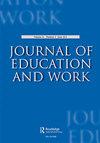The perceived labour market value of Massive Open Online Courses (MOOCs) in Europe and the USA
IF 1.5
Q2 EDUCATION & EDUCATIONAL RESEARCH
引用次数: 2
Abstract
ABSTRACT The advantages of higher education have received significant attention over time. However, recent research seems to challenge this assumption. It highlights that returns to education may be subject to inflation, may vary in relation to skills, and may not be equally distributed, thus posing new questions about the role of formal education. Against this background, the growing popularity of new forms of online education and training such as MOOCs (Massive Open Online Courses) have emerged. Investigating the way different learners use MOOCs may contribute to a deeper understanding of the evolution of the labour market outcomes of both traditional and technologically-mediated educational qualifications. Based on 43 semi-structured interviews conducted with MOOC users in the USA and in Europe, this article explores the potential of MOOCs on the labour market. The positional competition approach can help frame the results, inasmuch as MOOCs emerge as ‘soft credentials’. These accessible and flexible educational tools seem to provide applicants in the job queue with additional resources, although their labour market value remains modest and ancillary to formal educational qualifications. From a long-term perspective, however, increasing reliance on this type of training may contribute to further shifting of responsibilities from collective actors to individual workers.欧洲和美国大规模在线开放课程(MOOCs)的劳动力市场价值
随着时间的推移,高等教育的优势受到了人们的广泛关注。然而,最近的研究似乎挑战了这一假设。报告强调指出,教育回报可能受到通货膨胀的影响,可能因技能而异,可能分配不均,因此对正规教育的作用提出了新的问题。在此背景下,mooc (Massive Open online Courses,大规模在线开放课程)等新型在线教育和培训形式日益流行。调查不同学习者使用mooc的方式,可能有助于更深入地了解传统和技术中介教育资格对劳动力市场结果的演变。基于对美国和欧洲的MOOC用户进行的43次半结构化访谈,本文探讨了MOOC对劳动力市场的潜力。位置竞争的方法可以帮助构建结果,因为mooc是一种“软证书”。这些方便和灵活的教育工具似乎为求职队伍中的申请人提供了额外的资源,尽管它们的劳动力市场价值仍然不大,并且是正规教育资格的附属品。但是,从长期的角度来看,增加对这类培训的依赖可能有助于进一步将责任从集体行为者转移到个别工人。
本文章由计算机程序翻译,如有差异,请以英文原文为准。
求助全文
约1分钟内获得全文
求助全文
来源期刊

Journal of Education and Work
EDUCATION & EDUCATIONAL RESEARCH-
CiteScore
2.70
自引率
14.30%
发文量
40
期刊介绍:
The Journal of Education and Work is an international forum for academic research and policy analysis which focuses on the interplay of the education and economic systems. The journal examines how knowledge, skills, values and attitudes both about and for work and employment are developed within the education system. The journal also explores the various forms of industrial training and accreditation in the economic system, including changes in the economic and industrial infrastructure which influence the type of employees required. Work in the informal economy is also included.
 求助内容:
求助内容: 应助结果提醒方式:
应助结果提醒方式:


